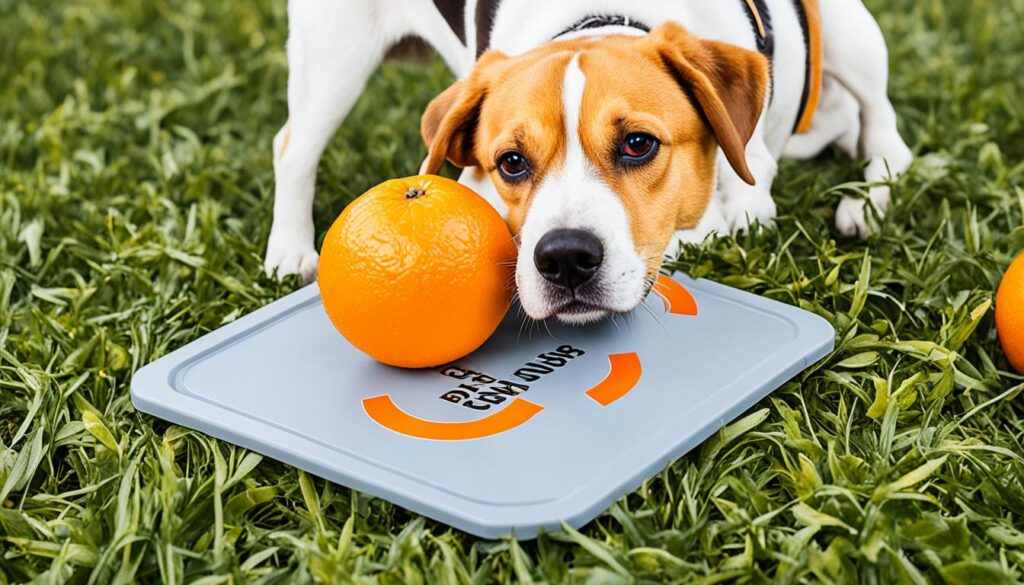As an Amazon Associate I earn from qualifying purchases.
Imagine this: you’re sitting on a sunny afternoon, enjoying a refreshing orange, when suddenly, your furry companion comes bounding up to you with those adorable puppy eyes. Your heart melts as they beg for a taste of that juicy goodness. But before you give in to their pleading gaze, you start to wonder: Can dogs eat oranges?
Well, wonder no more! In this article, we’ll dive deep into the world of dogs and oranges, exploring the benefits, risks, and everything in between. So whether you’re a concerned dog parent or just curious about canine nutrition, let’s uncover the truth about this citrusy snack.
Before we dig into the details, it’s important to note that dogs have different nutritional needs than humans. While some human foods can be harmful to our furry friends, others can provide them with valuable nutrients. So when it comes to oranges, what should you keep in mind?
Key Takeaways:
- Oranges, tangerines, and clementines are safe for dogs to eat in small quantities, but the peel and seeds must be removed.
- Oranges are rich in vitamin C, potassium, and fiber, which can support your dog’s immune system, muscle function, and digestion.
- Dogs that are overweight, diabetic, or have sensitive stomachs should avoid oranges.
- Puppies can enjoy oranges, but be cautious of potential gastrointestinal upset.
- Oranges can be served as a snack, food topper, frozen treat, or mixed with yogurt for your furry friend’s enjoyment.
Nutritional Benefits of Oranges for Dogs
Oranges are a delightful treat for your furry friend, packed with essential nutrients that can contribute to their overall health and wellbeing. Let’s take a closer look at the amazing benefits dogs can enjoy from this citrus fruit.
Vitamin C: The Immune Booster
Oranges are a good source of vitamin C, a powerful antioxidant that supports your dog’s immune system and helps reduce inflammation in their body. Just like humans, dogs rely on vitamin C to fight off infections and keep their immune system strong.
Potassium: Fuel for Muscles and Digestion
In addition to vitamin C, oranges also contain potassium, a mineral that plays a crucial role in muscle function and digestion. Potassium helps regulate nerve signals, maintain fluid balance, and supports healthy muscle contractions in your dog’s body.
Fiber: Promoting Gut Health
The fiber content in oranges is beneficial for your dog’s digestive system. Fiber promotes the growth of healthy gut bacteria, improving digestion and regulating bowel movements. It can also help prevent constipation and keep your furry companion’s tummy happy.
Low Sodium Content: A Healthy Snack
Dogs need to maintain a balanced sodium intake to support their overall health. Oranges are naturally low in sodium, making them a healthy snack choice for dogs. Choosing oranges as a treat for your four-legged friend can help minimize sodium intake while still providing a flavorful and nutritious reward.
“Oranges are packed with essential nutrients that can contribute to your dog’s overall health and wellbeing.”
When feeding your dog oranges, be sure to follow these guidelines. Remember, moderation is key:
- Remove the peel and seeds before serving; they can pose a choking hazard and cause digestive issues.
- Start with small quantities to test your dog’s tolerance and monitor for any adverse reactions.
- Introduce oranges gradually into your dog’s diet to avoid gastrointestinal upset.
- Consult with your veterinarian to determine the appropriate portion size based on your dog’s weight, breed, and overall health conditions.
Incorporating oranges into your dog’s diet can be a fun and healthy way to provide them with a boost of essential nutrients. Just remember to keep portion sizes in check and consider your dog’s individual needs. With the right approach, your furry friend can enjoy the benefits of oranges as a tasty and nutritious treat.
Risks of Dogs Eating Oranges
While oranges are generally safe for dogs, it’s essential to be aware of the potential risks involved. Understanding these risks can help you make informed decisions regarding your furry companion’s diet.
Natural Sugar and Weight Gain: Oranges contain natural sugars that can affect dogs’ blood sugar levels, especially those who have diabetes. If your dog has diabetes, it’s best to consult with your veterinarian before incorporating oranges into their diet to ensure it aligns with their specific dietary needs. Additionally, oranges are not suitable for dogs who are overweight, as the sugar content can contribute to weight gain. Remember, moderation is key.
Acidity and Stomach Sensitivity: Oranges have an acidic nature, which may cause stomach upset in dogs with sensitive stomachs. It’s important to introduce oranges gradually and monitor your dog for any signs of digestive discomfort. If your pup experiences any adverse reactions, it’s best to avoid oranges altogether or consult with your vet for guidance.
To summarize the risks:
- The natural sugar in oranges can affect blood sugar levels in dogs with diabetes.
- Oranges have an acidic nature that may cause stomach upset in dogs with sensitive stomachs.
Protect your furry friend by starting with small amounts of oranges and observing their response. If everything goes well, you can continue offering oranges as a nutritious treat for your canine companion.

How to Safely Feed Oranges to Dogs
If you’re wondering how to feed oranges to your furry friend, fret not! Safely incorporating this tangy fruit into your dog’s diet is easier than you think. Follow these simple steps to ensure a delicious and safe citrus experience for your canine companion.
- Wash the fruit: Start by giving the orange a good rinse to remove any dirt or pesticides.
- Remove the peel and seeds: Oranges should be enjoyed without the peel and seeds, as they can be difficult for dogs to digest. Peel the orange, making sure to remove all the pith and seeds.
- Cut into small pieces: Slice the orange into small, bite-sized pieces. This makes it easier for your dog to chew and swallow.
- Offer as a snack or mix into food: You can serve the orange pieces as a standalone snack or mix them into your dog’s regular food. Be sure to adjust the portion size based on your dog’s weight and nutritional needs.
- Create a frozen treat: For a refreshing twist, freeze the orange pieces in a Kong toy. It’s a fun and interactive way for your dog to enjoy the fruity goodness.
Remember, moderation is key when it comes to feeding fruits to your dog. Oranges should only make up a small portion of their overall diet. It’s important not to exceed 10% of their daily calorie intake from treats, including oranges.
“A little zest goes a long way when it comes to sharing oranges with your pup. Follow these tips to ensure a safe and citrusy treat!”
Of course, every dog is unique, so it’s always a good idea to consult with your veterinarian before introducing any new food into their diet. They can provide specific feeding guidelines based on your dog’s individual needs, weight, and breed size.
Orange Feeding Tips
Here are some additional tips to keep in mind while feeding oranges to your dog:
- Monitor for adverse reactions: Keep a close eye on your dog after they eat oranges. Some dogs may have sensitivities or allergies to citrus fruits, which can cause digestive issues or skin irritations. If you notice any adverse reactions, it’s best to avoid feeding oranges in the future.
- Stick to safe fruits: While oranges are generally safe for dogs, not all fruits are. Some fruits can be toxic to dogs, such as grapes and raisins. Stick to safe options like oranges, apples, blueberries, and bananas.

| Safe Fruits for Dogs | |
|---|---|
| Oranges | Rich in vitamin C, potassium, and fiber. Feed in moderation. |
| Apples | Contain vitamin A and C, as well as fiber. Remove seeds and core before feeding. |
| Blueberries | Packed with antioxidants and vitamins. Serve as a tasty and healthy treat. |
| Bananas | High in potassium and magnesium. Mash or slice for an easy-to-eat snack. |
Now that you know how to safely feed oranges to your dog, you can add a burst of citrusy goodness to their diet. Just remember to follow these guidelines, monitor their intake, and consult with your vet for personalized advice. Treat your pup to a juicy slice of orange and watch their tail wag with delight!
Conclusion
In conclusion, dogs can enjoy the occasional taste of oranges, reaping the benefits of their vitamin C, potassium, and fiber content. Oranges can be a healthy addition to their diet, as long as they are given in moderation and prepared properly. Remember, dogs should only have small quantities of oranges, and it is essential to remove the peel and seeds before offering them to your furry friend.
However, it is important to note that not all dogs can indulge in this citrus delight. Dogs with certain health conditions, such as being overweight or diabetic, should avoid oranges altogether. As with any dietary changes, it is always recommended to consult with your veterinarian before introducing new foods into your dog’s diet. They can provide specific guidance based on your dog’s individual needs.
When feeding oranges to your dog, it’s crucial to keep an eye out for any adverse reactions. While most dogs tolerate oranges well, some may experience stomach upset or allergic reactions. If you notice any signs of discomfort or unusual behavior, it’s best to discontinue feeding oranges and consult with your vet.
To ensure a balanced and healthy diet for your furry friend, it’s essential to consider oranges as a treat or occasional snack, rather than a staple food. Providing a variety of fruits and vegetables that are safe for dogs, in addition to their regular dog food, will help maintain their overall health and well-being.
FAQ
Can dogs eat oranges?
What are the benefits of oranges for dogs?
Are there any risks of dogs eating oranges?
How should oranges be fed to dogs?
Source Links
- https://www.petmd.com/dog/nutrition/can-dogs-eat-oranges
- https://www.akc.org/expert-advice/nutrition/can-dogs-eat-oranges/
- https://www.pumpkin.care/blog/can-dogs-eat-oranges/
As an Amazon Associate I earn from qualifying purchases.

